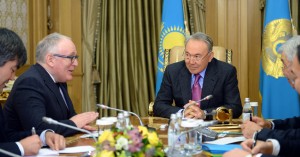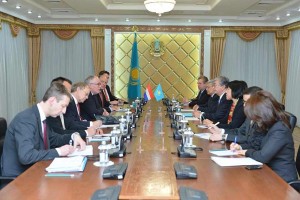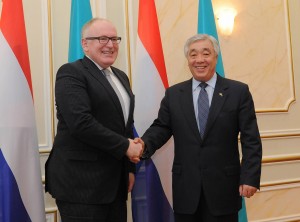 ASTANA – Dutch Foreign Minister Frans Timmermans visited the capital of Kazakhstan on Feb. 3 for a series of high-level meetings focused on expanding economic cooperation and building up the framework of joint efforts in working towards a world without nuclear weapons.
ASTANA – Dutch Foreign Minister Frans Timmermans visited the capital of Kazakhstan on Feb. 3 for a series of high-level meetings focused on expanding economic cooperation and building up the framework of joint efforts in working towards a world without nuclear weapons.
The second area of interest bears special importance and urgency as The Hague is preparing to host the Third Global Nuclear Security Summit on March 24-25 with the expected participation of about 50 heads of state or government and leaders of international organisations.
In Astana, Timmermans was received by President Nursultan Nazarbayev, Speaker of the Senate of Parliament Kassym-Jomart Tokayev and Deputy Prime Minister Bakhytzhan Sagintayev, and met with his counterpart, Erlan Idrissov.
During a meeting at the Ak Orda presidential residence, Nazarbayev and Timmermans focused on the March summit in which the Kazakh leader is expected to participate as well as looked at spheres where economic cooperation can be expanded further.
“The Netherlands is the largest investor in Kazakhstan’s economy and trade and economic partner for us among the countries of the European Union,” Nazarbayev said.
“My first mission for this visit is to officially pass on an invitation from the King of the Netherlands for you to visit our country and to take part in the Nuclear Security Summit in the Hague,” Timmermans said during the meeting, according to the Kazakh presidential press service. “We also plan to have bilateral meetings with our Prime Minister. We believe that we as country with access to open seas and developed port infrastructure, and Kazakhstan, as a country with huge potential, can achieve major results if we pool our efforts together.”
Welcoming Timmermans at Kazakhstan’s foreign ministry for their own meeting, Idrissov called ties between the countries “outstanding, especially in the economic sphere.”
“Dutch investment in Kazakhstan stands at almost $50 billion, which is about a quarter of all foreign investment in Kazakhstan [since independence],” Idrissov said. “Our trade with the Netherlands stands at almost $10 billion, which is among the highest in terms of bilateral trade turnover for Kazakhstan. There are more than 1,000 companies with Dutch capital participation registered in Kazakhstan, of which around 700 are actively working. And it is important that the spheres in which they work include not only energy, but also agriculture, pharmaceuticals, design and others.”
“Europe is Kazakhstan’s number one partner in terms of trade and investment, and within Europe, the Netherlands occupies a leading position,” Idrissov told a media briefing after his meeting with Timmermans. “This visit has a special significance because both Kazakhstan and the Netherlands stand for nuclear disarmament and non-proliferation.”
“Our countries are partners and friends. Our economic ties are of great importance to my country. And our economic ties, I am sure, will deepen and grow in the next couple of years,” Timmermans said at the same briefing in English. He began his comments in fluent Russian, recalling the thrill of skating at the Medeu rink outside of Almaty on his first private trip to Kazakhstan in 1990.
“We are deeply honoured that President Nazarbayev has accepted the invitation to attend the nuclear security summit and we are deeply honoured that he has accepted our invitation to have a bilateral visit on the same occasion,” Timmermans continued.
“Kazakhstan is a country that was heavily burdened by the past of the Cold War because of nuclear testing on its territory,” the Dutch foreign minister stressed. “Today, Kazakhstan is a global leader in trying to reach nuclear disarmament and trying to reach a nuclear weapons-free world. The Netherlands wants to be Kazakhstan’s partner in eliminating nuclear weapons from this world and also in creating possibilities for the peaceful use of nuclear energy.”
Kazakhstan and the Netherlands have already worked together to promote the nuclear disarmament agenda on the global level. In October 2012, the Hague-based Organisation for the Prohibition of Chemical Weapons (OPCW) hosted the first foreign presentation of The ATOM Project, an international education and online petition campaign launched by President Nazarbayev, which was attended by a vice-speaker of the Dutch Senate, members of its parliament and other officials. [Speaking to Kazakh reporters following his one day of meetings, Timmermans called The ATOM Project an “interesting” one.]
Earlier, in August 2011, the Netherlands and Kazakhstan jointly organised an international conference at the Peace Palace’s conference facility in The Hague drawing many renowned experts from Germany, Norway, the U.K. and other countries for a discussion on what could be done to move the global nuclear disarmament forward.
Fielding questions from Kazakh and Dutch media after their opening statements, Idrissov and Timmermans expounded on the upcoming global event in The Hague and on the security of nuclear materials in Kazakhstan.
“The nuclear security summit is not about nuclear weapons, but about creating more security in the world, so that nuclear energy can be used in a peaceful way, without security risks, without terrorists getting the opportunity to put their hands on nuclear materials and thus creating a huge threat to humankind,” Timmermans said. “So Kazakhstan, having its experience in the past, with its strong commitment to a safe world in terms of nuclear energy, is a global leader in this aspect, and we need Kazakhstan’s contribution to make a success of the nuclear security summit in The Hague in March.”
“We expect the summit to bring a real contribution in reaching a major goal of making the world safe from the nuclear energy standpoint,” Idrissov told the gathering in his turn. “The main meaning of the upcoming meeting of heads of state is to create conditions and mechanisms and to develop a firm political will for nuclear energy to have only peaceful aspects and not pose a destructive threat.”
 “Since our first days of independence, Kazakhstan has worked with leading nuclear powers to ensure security in the nuclear sphere,” Idrissov continued. “I think today, more than 20 years later, nobody has any doubts about Kazakhstan’s unblemished track record in terms of ensuring the physical security of nuclear materials and in terms of introducing and ensuring reliable mechanisms of export control. Moreover, we are confident that, in cooperation with our foreign partners, our human potential [in that area] has not been wasted.”
“Since our first days of independence, Kazakhstan has worked with leading nuclear powers to ensure security in the nuclear sphere,” Idrissov continued. “I think today, more than 20 years later, nobody has any doubts about Kazakhstan’s unblemished track record in terms of ensuring the physical security of nuclear materials and in terms of introducing and ensuring reliable mechanisms of export control. Moreover, we are confident that, in cooperation with our foreign partners, our human potential [in that area] has not been wasted.”
Idrissov went on to list some of the specific efforts his country was pursuing to ensure stronger security for nuclear materials in the country and internationally, including a new bank of low-enriched uranium to be created at the Ulba Metallurgical Plant in Ust-Kamenogorsk under the auspices of the International Atomic Energy Agency (IAEA). He called it a “global effort aimed at maintaining calm on uranium markets internationally so that all countries can get access to sources of nuclear energy.”
Another initiative is a nuclear training centre aimed at “expanding our capabilities and those of our partners in Central Asia in ensuring the physical protection of nuclear materials.”
“We are also working to convert our existing reactors from using highly enriched uranium to using low-enriched uranium,” Idrissov announced. “All of these are measures to make nuclear materials safe in Kazakhstan and in the region, and we will continue with them.”

